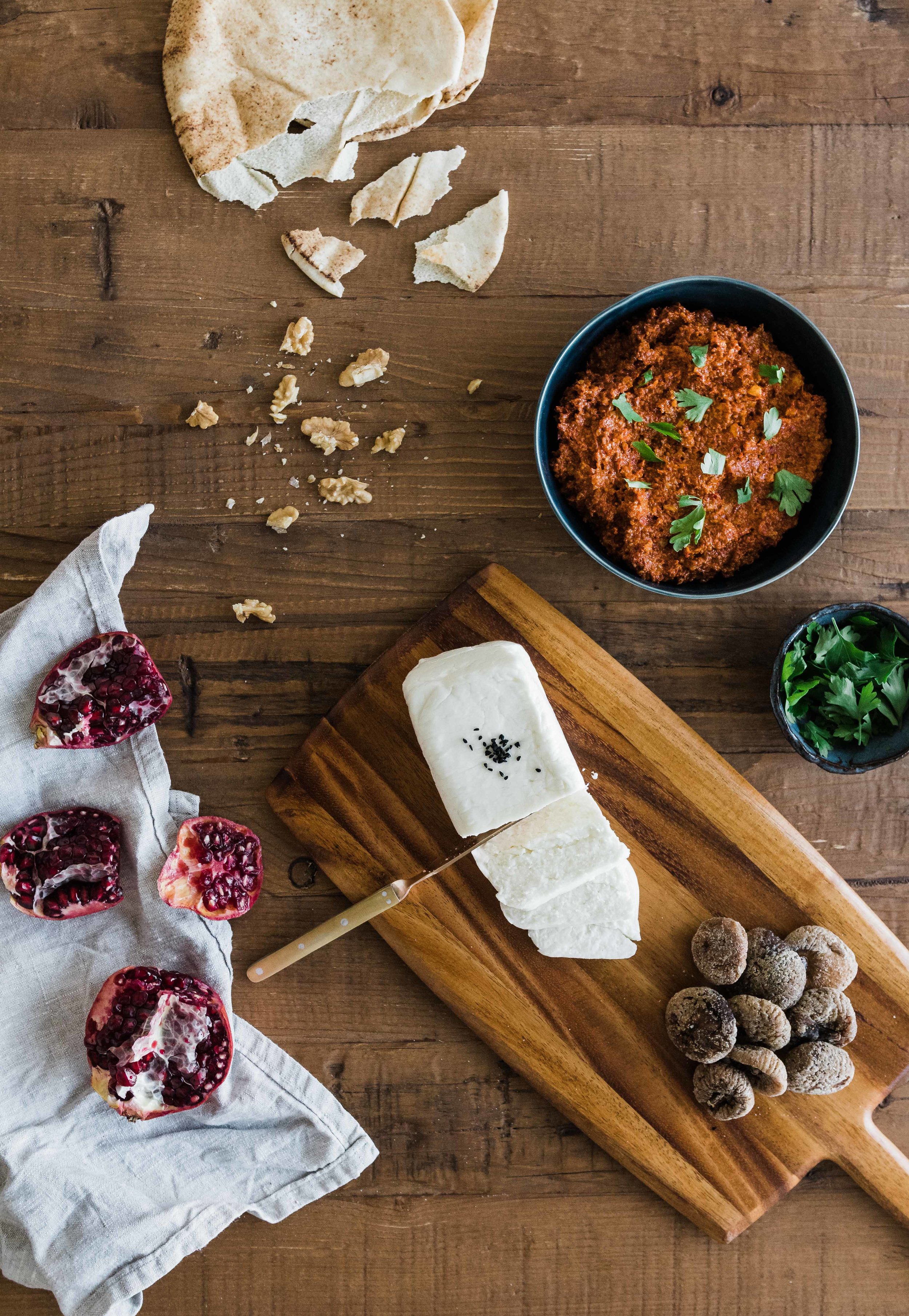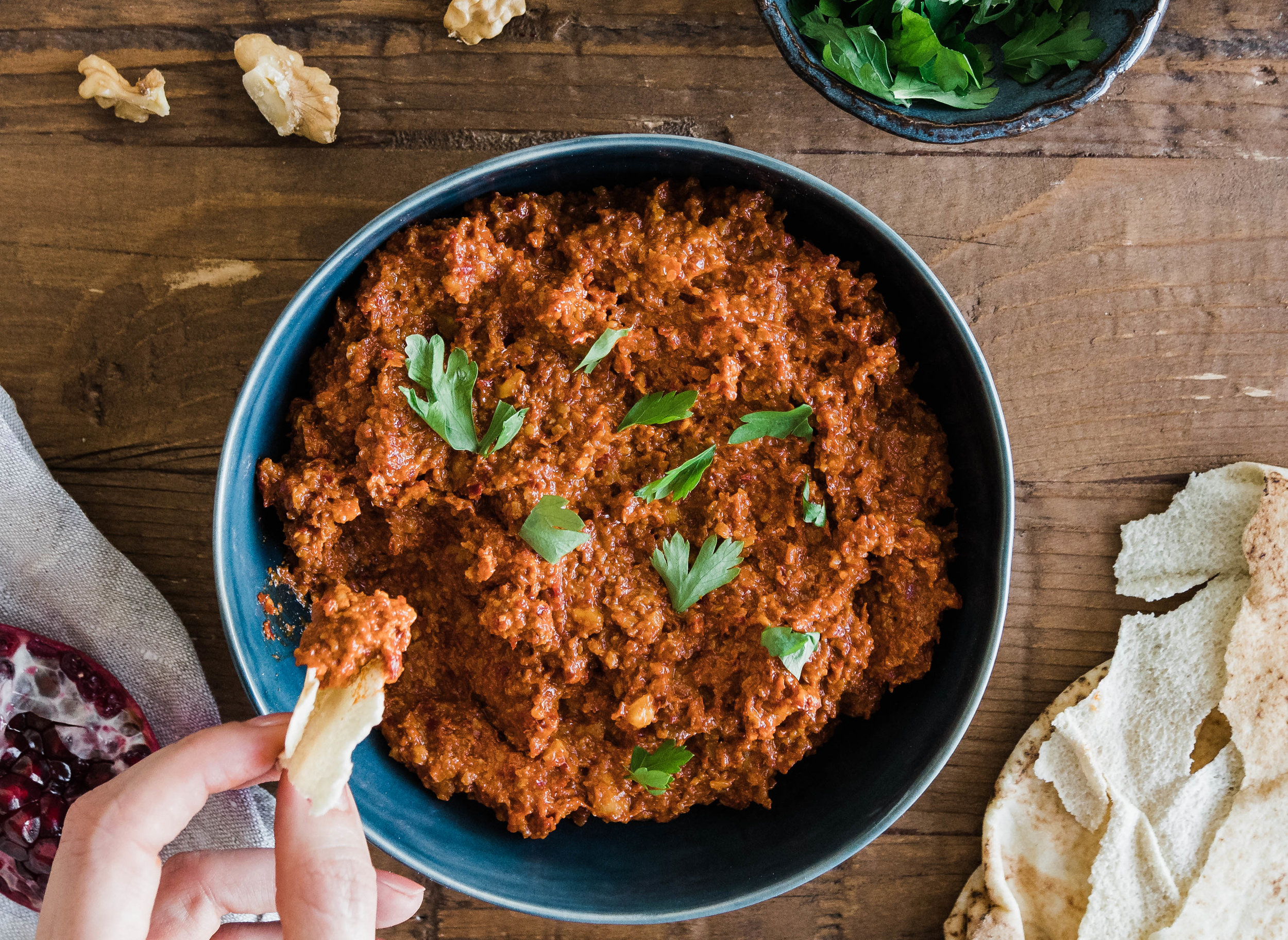Muhammara (Pepper and Walnut Dip)
Today I’m sharing a dish that hails from Aleppo: muhammara, or pepper and walnut dip.
If there’s any food that tells a story about a time and a place, muhammara is it. The tragic war in Syria not only destroyed lives and families, it also devastated the crop of a very special pepper: the Aleppo pepper. The Aleppo pepper has a very distinctive flavor. It’s salty, sweet, mildly spicy, and truly represents the flavors of Aleppo. While seeds have been transported to Turkey, many say that the in the new environment, the pepper can never really match the flavor of the true Aleppo pepper (if you want to learn more, there’s a really awesome article by the New York Times, which you can read here). Muhammara traditionally uses the Aleppo pepper in paste form, embodying all the special flavors of this ancient and historical city.
Syria was never home for me. It is my history and part of my identity, but I cannot speak for someone who has lost a home. The civil war felt like it happened overnight. Hopes of revolution and freedom rapidly descended into tragedy, crisis and hardship with no time to salvage life and memories. When one experiences loss, they quickly realize the things they took for granted. What I took for granted was a place where my entire family could be together. I took for granted being connected to the place where my people came from. And I also took for granted the regional flavors and cuisine. Because, as mentioned with the Aleppo pepper before, when the same food is transported to a new place, it never truly tastes like home. This is what makes muhammara so important. We may not get the true flavor of the Aleppo pepper, but we must keep the memory alive.
If you can source Aleppo pepper paste, that’s amazing (and please share)! But for now, we will use the next best thing, Turkish pepper paste. The south of Turkey is about 60 km from the Aleppo, and they have a pepper very similar to the Aleppo pepper. They follow the same practice of drying it for seasoning and turning it into paste. You might see some recipes telling you to use some combination of red bell peppers and chili peppers, but I encourage you to go out to the Middle Eastern grocery store and get yourself some Turkish pepper paste if you want to get close to the real thing (or just buy some on Amazon if you’re in the US). I get mine at Al Douri Mart in Dubai.
The making of muhammara can be controversial. Not only is the original pepper a hot button topic, but so are the rest of the ingredients. Some people add a piece of day-old bread and some people don’t. Some people add cumin, and some people don’t. Some people add onions, and some people don’t. But I’m here to share my mother’s recipe, which for me, is the most delicious (and is also a crowd favorite).
My mother grinds up some walnuts and combines them with the pepper paste, olive oil, lemon juice, pomegranate molasses, cumin, salt and a touch of sugar. That’s it! The result is sweet, slightly spicy, and tangy. The chopped walnuts combined with the paste gives the ultimate texture, making it spreadable, dippable and eat-with-a-spoonable. Best of all, since it does not contain onions, you can keep this muhammara in the fridge for up to TWO WEEKS and can easily freeze it.
The traditional recipe DOES call for day-old pita bread. She stopped using the bread when requests were made for gluten-free muhammara. She realized that the bread didn’t add much in terms of flavor. Her theory is that some people use it as a filler in place of expensive walnuts. This one might be a high-brow muhammara, but I wouldn’t have it any other way. I really hope you love it as much as I do! And when you eat it, always remember Aleppo.
Muhammara is often times served as an appetizer with pita bread. It is also most often eaten with kibbeh, which is a delicacy made by forming a ball of ground meat and bulghur and deep frying, but I’ll get to that another time.
Muhammara (Pepper and Walnut Dip)
Serves 10-15
1.5 lbs Turkish pepper paste
1.5 lbs walnuts, plus more for garnish
1/4 c pomegranate molasses
1/2 c lemon juice
1.5 c good quality olive oil
1.5 Tbsp cumin
1/2 tsp salt
1/4 tsp sugar
Olive oil to finish (optional)
Start by pulsing the walnuts in the food processor until they’re finely chopped.
Combine the walnuts with the remaining ingredients in a large bowl. Taste and adjust acidity and salt.
Allow to marinate for a few hours, preferably 1-2 days, in the fridge.
Before serving, drizzle with olive oil and top with additional walnuts.
Store in an airtight container in the fridge up to 2 weeks.



